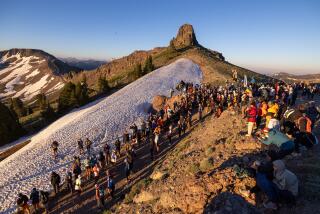New York City Marathon : Jones, Waitz, Turn Hard Times Into Fast Times
- Share via
NEW YORK — For some, Sunday’s New York City Marathon was a chance to replace the summer’s bitterness and frustration with a measure of respect and fame that victory in few other marathons, apart from the Olympics, can offer.
For Great Britain’s Steve Jones, a victory here would mean redemption after he initially failed to make his country’s Olympic team--and then was invited to join later, when he felt there was no time left to train.
“I’m not dwelling on the disappointment of not going to Seoul,” said Jones, a Welshman who holds the fourth fastest marathon time. “I wanted to come to New York and win in New York.”
And win he did.
Jones took command while crossing the Queensboro Bridge--between the 15th and 16th miles--and was not challenged again, winning his first New York City Marathon in 2 hours 8 minutes 20 seconds.
“I just put my head down at that point on the bridge and never looked back,” he said.
In a solid performance on a warm, sunny day--difficult conditions to run a 26.2-mile race--Jones’ time came within 7 seconds of Alberto Salazar’s 1981 course record.
“I didn’t care about the record,” said Jones, who would have made an additional $15,000 with his $26,385 first-place winnings if he had run faster than Salazar’s 2:08:13. “I came here to win. I didn’t care about the record.”
Jones, whose best is a 2:07:13 run in Chicago in 1985, left behind Italy’s Salvatore Bettiol, who placed second more than 3 minutes behind, in 2:11:41 and Ireland’s John Treacy, who ran 2:13:18 for third.
Gidamis Shahanga of Tanzania was fourth in 2:13:50 and Juan Carlos Montero of Spain placed fifth in 2:14:00.
For Norway’s Grete Waitz, forced to drop out of the Seoul Olympics race after 18 miles, a win here would mean her ninth New York City victory, more than any runner has achieved in a single race. And it would also mean a triumph over 1984 Olympic champion Joan Benoit Samuelson, whom she had raced at this distance only once before, in the Los Angeles Games, where she placed second.
And win she did.
The race belonged to Waitz after Samuelson, running her first marathon in 3 years, was hobbled by stomach cramps after the 10th mile, left the course at mile 14 to make a pit stop, and never regained the ground she had lost.
Waitz finished in 2:28:07.
“The Olympics is something very special,” Waitz said. “But after dropping out in Seoul and not being able to run here last year--that made this win a little bit sweeter than the others.”
It was a bad day for Samuelson who, after 3 years--having a baby and struggling with injuries--was eager to return successfully to serious competition. She finished third, in 2:32:40, after Italy’s Laura Fogli, who ran second in 2:31:26.
Karolina Szabo of Hungary was fourth in 2:36:40 and Kerstin Pressler of West Germany finished fifth in 2:37:35. Defending women’s winner Priscilla Welch of Great Britain dropped out after 16 miles with a sore left shoulder.
Samuelson was in striking distance of second place, but misfortune struck again at mile 21, just outside Central Park. She was blindsided by a young race volunteer running onto the course to give another runner a cup of water, and she crashed to the ground in a full somersault.
Before she fell, she said, “I did have Laura in sight. But I never would have caught Grete. That was obvious.”
Samuelson, whose last marathon was a career best of 2:21:21, said she was hoping to break 2:32 in her first attempt at the New York race, but, “whenever you lose to Grete, it’s an honor. Grete does own New York. She’s unbelievable on this course.”
Samuelson, humbled by her first marathon loss in 7 years, added: “I won’t let 3 years go by before I run another.”
Nearly 23,000 runners lined up on the Verrazano-Narrows Bridge in Staten Island to run the five-borough course under a sunny sky with temperatures in the high 50s, later climbing to the 60s.
Juan Romera, a little known runner from Spain with a respectable best of 2:11:52, led for the first 12 miles, running alone at a sub-2:08 pace. At about 12 miles, in the Greenpoint section of Brooklyn, he was swallowed by a pack of about 18, which included Jones, Treacy, Bettiol, Shahanga, Wodojo Bulti of Ethiopia, and Antoni Niemczak of Poland, who was running his first marathon after a 2-year suspension for a positive drug test. Niemczak finished 18th in 2:16:05, Bulti 12th in 2:14:43.
The pack was unconcerned about Romera, confident they would reel him in. “I don’t think anybody took much notice of him,” Treacy said. “If it had been Steve Jones, that would have been different.”
The lead pack began to shrink after the halfway point, reached at 1 hour 4 minutes 14 seconds. By the time the runners reached the Queensboro bridge leading into Manhattan, Jones had pulled away for good.
“It was a measure of my restraint that I held back,” Jones said.
Bettiol had his share of problems, saying he was “very happy” to have finished second. During the last 6 miles in Central Park, he experienced severe leg cramps that crumpled him to the road for several agonizing seconds.
“He thought he couldn’t finish the race,” said two-time New York winner Orlando Pizzolato, who served as Bettiol’s interpreter at a post-race news conference.
Jones, when asked when he realized he had won, said: “With about 385 yards to go. I turned around, didn’t see anybody, and that was it then.”
More to Read
Sign up for Essential California
The most important California stories and recommendations in your inbox every morning.
You may occasionally receive promotional content from the Los Angeles Times.










